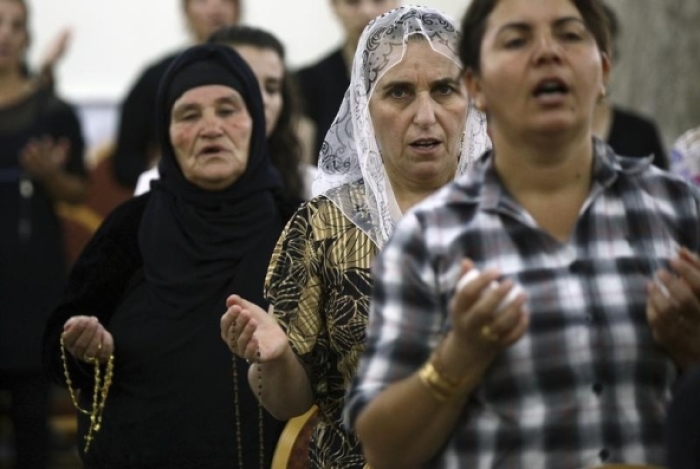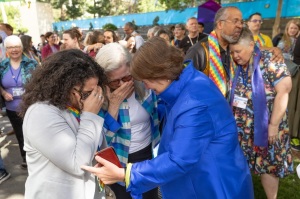Report: 9 Trump Admin Actions to Protect Religious Freedom Abroad

WASHINGTON — Respected religious freedom scholars have released a list of recommendations that the Donald Trump administration and the United States Congress should take seriously in order to better equip the U.S. government to combat rising threats to international religious liberties through diplomacy.
On Monday, the the D.C-based Religious Freedom Institute (RFI) and the Center on Faith & International Affairs at the Institute for Global Engagement held a briefing on Capitol Hill for congressional staffers in which they rolled out a new policy brief titled "U.S. Foreign Policy and International Religious Freedom: Recommendations for the Trump Administration and the U.S. Congress."
The brief was authored by RFI President and Georgetown University professor Thomas Farr and IGE Vice President for Research and Publications Dennis Hoover. The briefing included remarks by Farr and Hoover, as well as remarks by Republican Sens. Bob Corker of Tennessee and Cory Gardner of Colorado. Additionally, Republican Reps. Trent Franks of Arizona, Bill Flores of Texas and former U.S. Ambassador to the Holy See Francis Rooney, who is now a Congressman from Florida, also spoke about the importance of using U.S. foreign relations to pressure other nations to protect the rights of religious minorities.
The brief comes as 75 percent of the world's population lives in countries where there is virtually no freedom of religion.
"The United States is not responsible for this state of affairs but I would argue that we could do more and must do more, not only for those people but for our own children and grandchildren, for our own national security, for our own fundamental interests," Farr said during the briefing.
Included in the brief are nine sets of recommendations for the Trump White House, National Security Council, Department of Defense and State Department to consider.
1. Trump should set "clear policy priority" for international religious freedom and commit the institutional and financial resources necessary to succeed.
The brief asserts that the president should "state clearly" to the world that religious freedom is "vital" to U.S. interests and the interests of all nations, "especially those in which religious violence and persecution are destroying societies, uprooting minorities and stunting economic growth."
The brief calls on the president to publicly assert that international religious freedom policies will be expanded under his administration and that human rights issues will be "raised regularly" in bilateral discussions, even in discussions with U.S. allies, such as Pakistan or Saudi Arabia, where blasphemy laws and other laws targeting religious minorities are on the books.
The brief wants international religious freedom to be integrated into U.S. strategies in order to "reduce religious persecution, protect minorities, counter violent religious extremism and conflict," and stabilize post-conflict societies.
"President Trump should speak jointly with other world leaders about religious freedom as a universal human right and a necessity for peace, security and stability," the brief states.
It also calls for Trump's National Security Advisor, H. R. McMaster, to name a senior National Security Council Adviser on international religious freedom policy.
2. Establish an inter-agency task force to create an international religious freedom policy strategy.
The brief's second set of recommendations calls for Trump to produce a "presidential directive" on international religious freedom.
But before issuing the directive, the brief explains that McMaster should announce an inter-agency task force focusing on international religious freedom, which would be co-chaired by the State Department's ambassador at-large for international religious freedom and the aforementioned National Security Council advisor on international religious freedom.
The task force would be responsible for creating a national security strategy for international religious freedom policy, which would incorporate aspects of counterterrorism, political and economic development, post-conflict stabilization and justice.
"The strategy should lead to a presidential national security directive on IRF policy," the brief states. "The strategy should be incorporated into strategic plans of all executive agencies with foreign policy responsibilities."
"The strategy should emphasize the critical importance of ongoing IRF education across all national security institutions and in interagency contexts," it added.
3. State Department should give greater authority and resources to the Office of International Religious Freedom.
Farr said that one of the most important recommendations in the brief is for Trump to quickly nominate and secure a Senate confirmation of a highly qualified ambassador at-large for international religious freedom.
Under President Barack Obama, that post was vacant for the first 845 days of his presidency. Farr is optimistic that Trump will make that nomination by the spring or early summer.
Along with nominating an ambassador for international religious freedom, the brief calls on the administration to "elevate the status of the position of special advisor for religious minorities" to "special envoy."
It also calls for the administration to improve relationships between the State Department's Office of International Religious Freedom and other religion-related offices in the department and also consider placing other offices, such as the special envoy on anti-semitism, under the authority of the ambassador at-large for international religious freedom.
The brief also calls for the Office of International Religious Freedom to increase its staff to no less than 50 full-time foreign service officers and civil servants, which can be achieved by consolidating other religion-related offices under its umbrella.
The brief also suggests that the State Department should request no less than $30 million per year from Congress for programs that will advance religious freedom and counter religious extremism.
Additionally, the brief wants each regional State Department bureau to develop religious freedom strategies as part of their annual program planning. Additionally, each bureau should establish an international religious freedom officer position to make it easier for each regional bureau to collaborate with the Office of International Religious Freedom.
4. Develop a mandatory international religious freedom training curriculum for "all American diplomats."
The brief calls on the State Department to immediately implement a component of the Frank Wolf International Religious Freedom Act passed last December that requires the State Department to provide "mandatory training on religious freedom for all Foreign Service officers."
"I would argue that still, the Department of State is still highly skeptical on the issue of [religious freedom]. ... They are skeptical of thinking in religious categories. They may be anti-religious or they may be not anti-religious," Farr said. "It is almost in the DNA not to think about religion, particularly about religious freedom. I know this is changing but it is not changing fast enough."
Andrew Bennett, the first and only Canadian Ambassador for Religious Freedom, spoke at the briefing and said that there tends to be a misunderstanding in Western intelligence communities that religion should be pushed to the "private sphere."
"Those of us who have gone through secular universities, or secular education system, for a very long period of time, we have seen ideas of religion, faith literacy, religious literacy pushed squarely to the private sphere," he said. "The absolute privatization of religion in Western democracies has had a number of impacts. One of the impacts is that when it comes to the formation of liberal beliefs ... there is a lack of knowledge about why the people of faith act the way they do."
"We have to combat indifference and ignorance around the role of religion in our own countries if we are going to advance religious freedom internationally," he said.




























